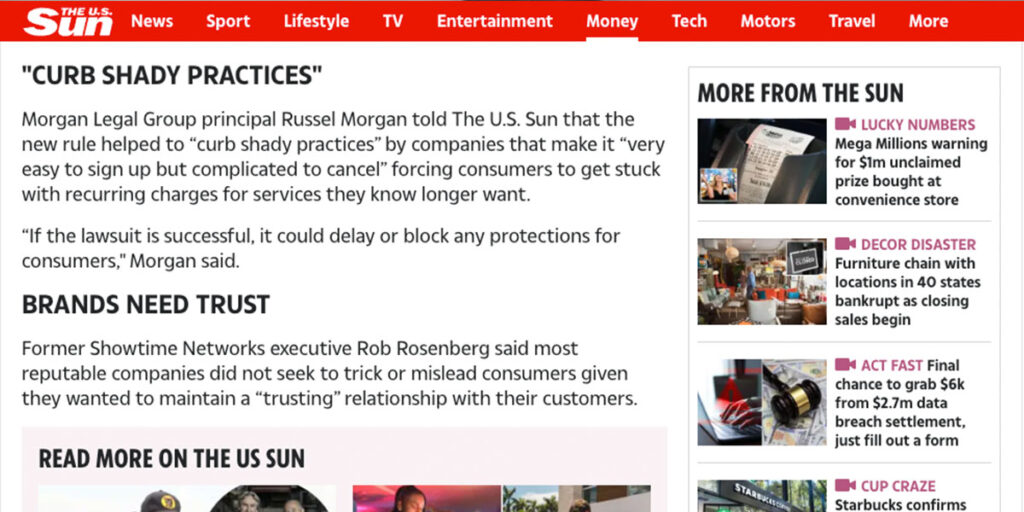Cancel Culture: Understanding the FTC’s “Click to Cancel” Rule and What’s at Stake
On October 16, the Federal Trade Commission (FTC) introduced a significant new rule to simplify online subscription cancellations. Known as the “Click to Cancel” rule, it mandates that companies like Amazon, Disney, and Netflix offer straightforward online options for consumers wishing to cancel subscriptions. Consumers will no longer be required to navigate endless prompts or call customer service.
What is the Click to Cancel Rule?
This new FTC regulation responds to longstanding consumer complaints about complicated, often opaque subscription cancellation processes. As Russel Morgan, principal of Morgan Legal Group in New York City, puts it, “The ‘Click to Cancel’ rule was designed to curb shady practices, allowing consumers to cancel services they no longer need easily.”
The rule essentially mandates that if signing up for a subscription is possible online, canceling it must be equally straightforward. Companies must provide clear, easy-to-follow cancellation steps and cannot hide the option within multiple sub-menus or lengthy phone interactions.
How Does the Click to Cancel Rule Protect Consumers?
The “Click to Cancel” rule is rooted in consumer protection. Here’s how it benefits users:
- Simplified Cancellation: The rule requires companies to offer online cancellations that are as accessible as their signup processes.
- Transparency and Ease: No more hidden cancellation options buried within a website or requiring phone calls.
- Prevention of Unwanted Charges: Consumers avoid unwanted recurring charges by making cancellation straightforward.
How Major Companies Are Reacting to the Rule
While consumer advocacy groups have widely praised the rule, major companies have raised concerns. Companies like Amazon and Disney argue that the rule is overly restrictive, interfering with their ability to engage with customers. These companies and others have filed a lawsuit contesting the FTC’s authority to impose such a rule, contending that it may impact their revenue from subscriptions that are often hard to cancel.
Arguments for and Against the Rule
Consumer advocates argue that FTC’s rule is necessary for fairer business practices. By forcing companies to simplify their cancellation processes, it seeks to prevent consumers from being charged for services they no longer want or use. Consumer protection groups have noted that hard-to-cancel subscriptions drain customer finances and waste valuable time.
However, businesses argue that the FTC’s rule oversteps its authority. Their main concerns include:
- Potential Revenue Impact: Companies could face decreased profits from easy-to-cancel subscriptions.
- Increased Operational Costs: Implementing a user-friendly cancellation system may incur associated expenses.
- Loss of Customer Retention Tactics: Many companies’ retention efforts include persuading customers to keep subscriptions; this rule limits that interaction.
The Broader Impact of the Click-to-Cancel Rule
This rule reflects a broader push toward consumer rights and transparency in digital transactions. As consumers increasingly rely on subscription services, the protection against unwanted charges has become a significant focus of regulators. In New York, as in other states, consumers stand to gain greater control over their spending, while companies are tasked with adapting to a more straightforward and consumer-friendly approach.
How Does This Rule Affect New York Residents?
This rule means easier subscription management for New York residents. In a state with some of the highest digital engagement rates, New Yorkers often encounter subscription models for streaming, news, fitness, or online shopping. Previously, canceling subscriptions could involve lengthy, inconvenient processes that trapped many in unwanted services. Now, consumers in New York will benefit from a uniform, simplified approach to subscription cancellations.
Legal Ramifications if Companies Refuse to Comply
Non-compliance with the “Click to Cancel” rule may result in substantial penalties for companies. The FTC holds the authority to enforce compliance and fine businesses employing deceptive cancellation tactics. Additionally, as more cases regarding digital consumer rights come forward, companies may face heightened scrutiny and public backlash.
Russel Morgan comments on the legal landscape, “The FTC’s rule, if successfully upheld against corporate lawsuits, could set a legal precedent impacting how companies manage online cancellations. This ruling may encourage future consumer-protection policies at both federal and state levels.”
What This Means for Businesses Operating in New York
For businesses in New York, compliance with the “Click to Cancel” rule is necessary and can serve as an opportunity. Companies can enhance customer loyalty by meeting consumer demands for transparency and simplicity. In a competitive market like New York, where consumer trust can be a deciding factor, complying with this rule may positively impact brand perception.
What Could Happen If the Rule Is Overturned?
Should the lawsuit from companies succeed and block the rule, the current consumer protections may be compromised. The implications could extend beyond just online subscriptions to other areas where companies use prolonged customer-retention tactics. Without the rule, consumers may once again struggle to cancel subscriptions. A successful challenge could embolden companies to implement even more restrictive cancellation processes.
Stay Informed: Tips for New York Consumers
With evolving consumer protection regulations, it is essential for individuals to stay aware of their rights. Here are a few tips:
- Read Terms of Service Carefully: Before signing up for any service, read through cancellation policies.
- Check for FTC Updates: The FTC regularly updates its policies to protect consumer rights. Staying informed helps consumers understand their legal protections.
- Consult a Legal Expert: Consulting an attorney ensures that consumers have a comprehensive understanding of their options when seeking assistance with complex terms or issues related to online cancellations.
Conclusion: A Shift Toward Transparency and Consumer Empowerment
The FTC’s “Click to Cancel” rule represents a landmark change in consumer protection, particularly in the digital sphere. By mandating easy subscription cancellations, the rule provides a shield against unwanted charges and improves consumer control. While companies may view this rule as a hindrance, it opens a pathway for fairer and more transparent digital interactions.
As the legal battles continue, Morgan Legal Group remains committed to helping New Yorkers navigate changes in consumer law, ensuring clients stay informed of their rights and take full advantage of protections available under the law.










